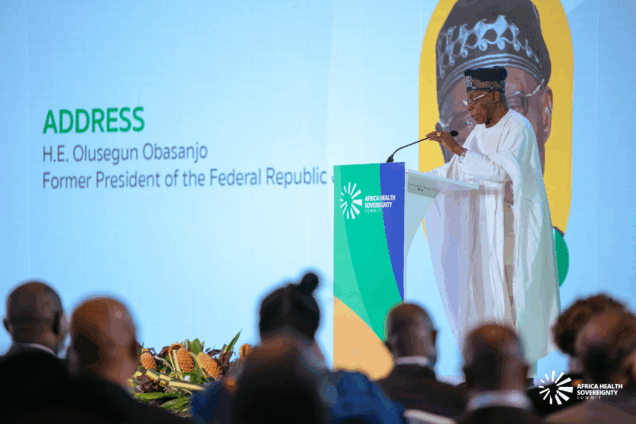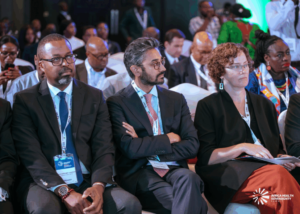At Accra summit, former Nigerian President calls for African-led financing model to reduce foreign aid dependency and strengthen health sovereignty.
By Alex Ababio
Accra, Ghana — Former Nigerian President Olusegun Obasanjo has urged African leaders to establish a dedicated Africa Health Fund aimed at financing critical health infrastructure and emergency response systems without overreliance on foreign aid.
Speaking passionately at the Africa Health Sovereignty Summit in Accra, Obasanjo said the time had come for Africa to take full responsibility for its health future.
“If we can do this for peace, we can certainly do it for health,” he declared, referencing the success of the African Union Peace Fund, which he cited as a model for the proposed health fund.
Africa Must Act with Speed and Self-Determination
Drawing from his experience as the African Union’s special envoy to the Horn of Africa, Obasanjo recounted how efforts to intervene in crises were hampered by funding delays from international partners.
“When I was handling the situation in Ethiopia, they were waiting for European money or American money before I could start,” he said. “But when we started using the AU Peace Fund, things changed.”
Obasanjo warned that continued dependency on donor aid during emergencies was a recipe for disaster. “We must empower ourselves to respond quickly and decisively,” he urged.
Innovative Financing: $100 Levy on International Flights
To raise initial capital for the Africa Health Fund, the former Nigerian leader proposed a $100 levy on all international flights entering or exiting the continent—excluding intra-African travel. The proceeds, he suggested, could be managed by the African Development Bank (AfDB) as seed funding for the health initiative.
Obasanjo also called on African nations to seek innovative domestic sources to grow the fund into a long-term financial engine for both emergency responses and sustainable health development.
Health Is Not a Burden – It’s National Security
Obasanjo further recommended that 25% of all national health insurance funds across African countries be earmarked specifically for infrastructure development.
“Health is not a drain on our resources,” he insisted. “It is the foundation of our national security and development.”
He called on governments to reframe health investment not as consumption but as a strategic pillar of economic growth.
Championing Traditional Medicine and Community Resilience
The former President also emphasized the need to incorporate traditional medicine into Africa’s health strategy at the community level.
He praised the continent’s past resilience in crises such as HIV/AIDS, Ebola, and COVID-19, encouraging leaders to build on those hard-won lessons.
Mahama: Africa Must Rewrite Global Health Rules
Opening the summit, Ghana’s former President John Dramani Mahama delivered a stirring address in support of a radical shift in the global health architecture.
“Africa must no longer be a passive recipient of solutions,” he said. “We must be the author and architect of our own health destiny.”
Mahama criticized the current global health governance system as “outdated and unfit for a multipolar world”, warning that Africa faces intersecting threats—from pandemics to climate shocks—that require bold, sovereign action.
Concrete Commitments: Presidential Task Force and SUSTAIN
In a major policy announcement, Mahama unveiled two key initiatives:
1. A Presidential High-Level Task Force on Global Health Governance
2. The launch of the SUSTAIN Initiative – a continent-led platform designed to align national budgets with health priorities and scale domestic investment.
“We are here by conviction, shared purpose, and a collective refusal to accept the limits imposed on us,” Mahama said.
He stressed that health should be seen as “a capital investment, not a social cost”, urging African nations to leverage public, private, and diaspora resources to build resilient, data-driven health systems.
Accra Compact: A New Roadmap for Africa’s Health Sovereignty
The summit is expected to conclude with the adoption of the Accra Compact, a bold declaration to establish health sovereignty across Africa. The Compact includes policy directions, investment mechanisms, and reforms aimed at turning Africa’s health ambitions into actionable strategies.
Through initiatives like SUSTAIN and the proposed Africa Health Fund, African leaders hope to reclaim control of the continent’s health future and build systems that work for Africa, by Africa—with global cooperation, not dependency.
“Our slogan should not be ‘Africa Beyond Aid,’” Obasanjo concluded. “It should be ‘Africa Health Without Aid’—but with global partnership and support.”



